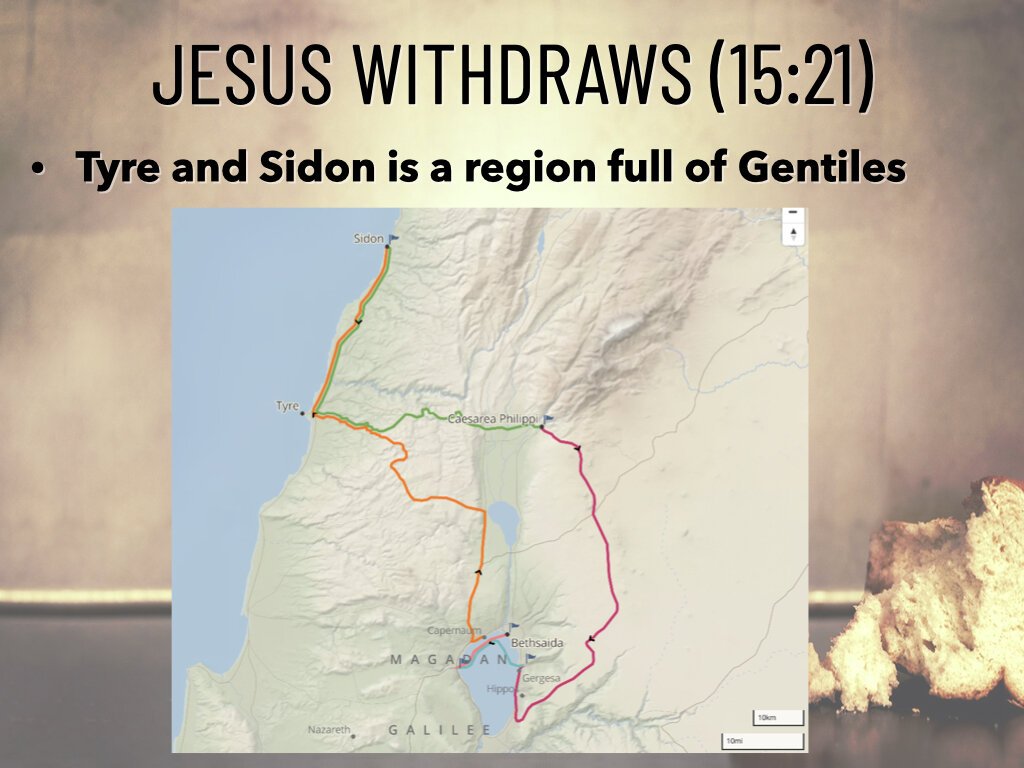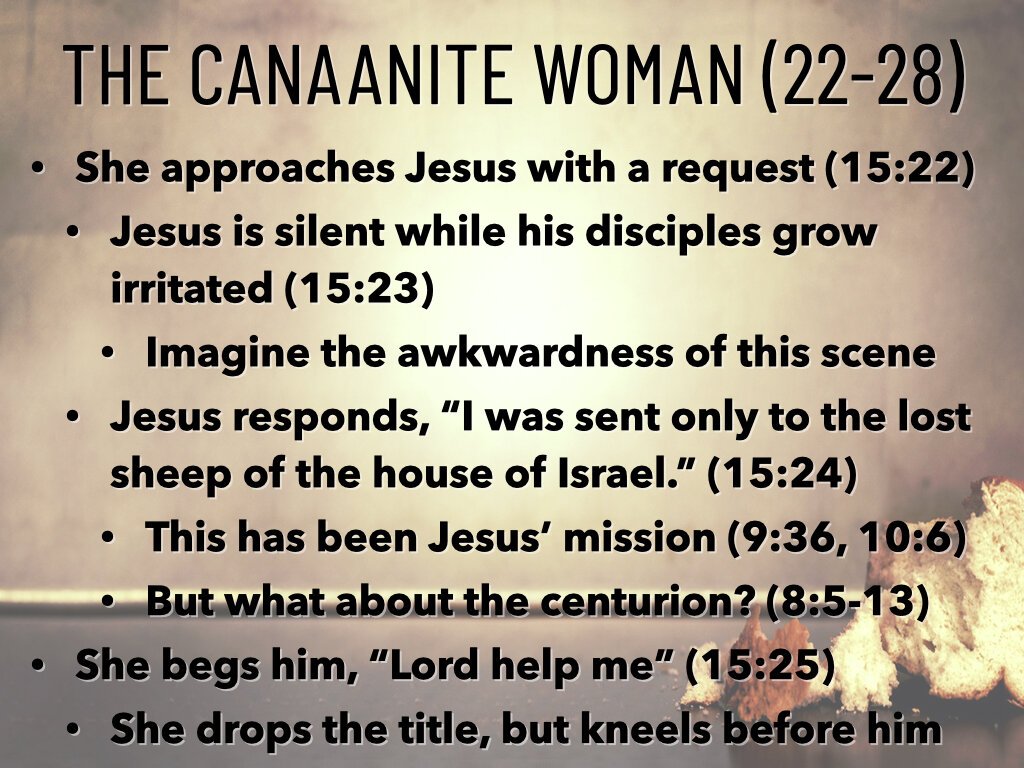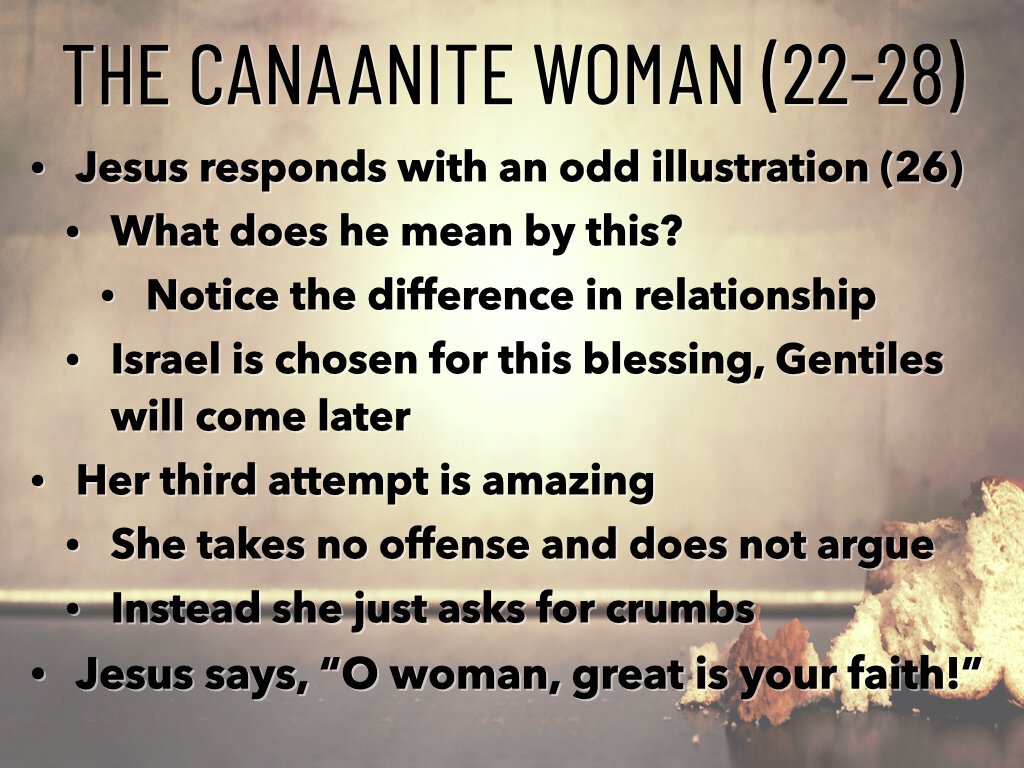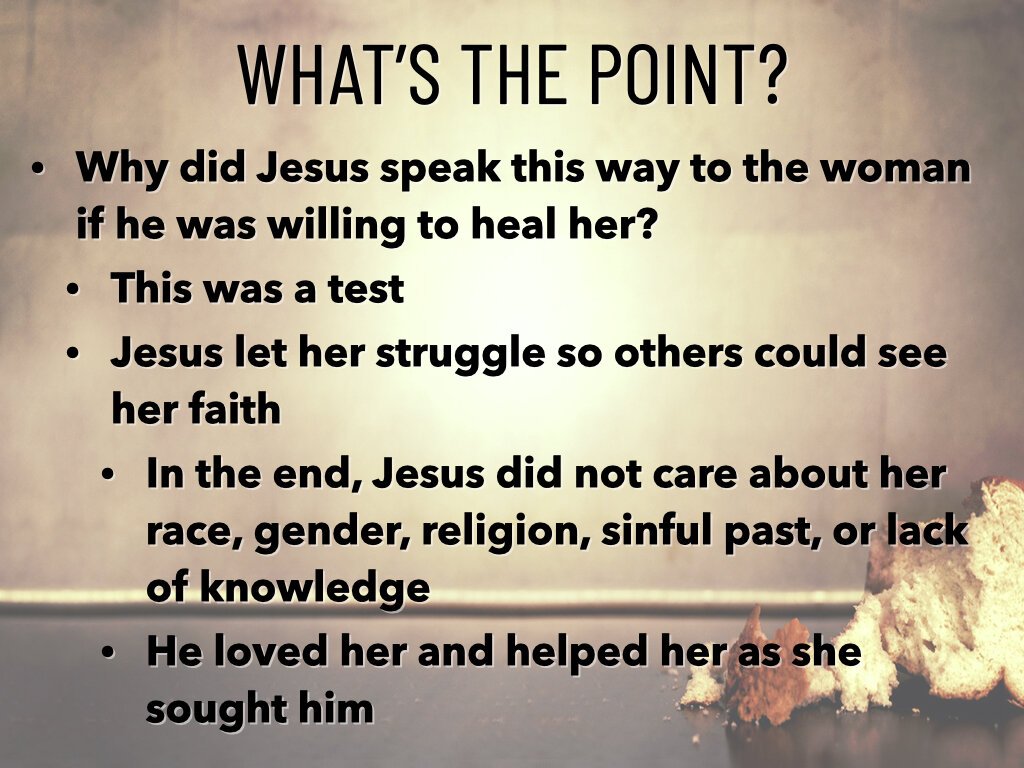Crumbs (Matthew 15:21-28)
What obstacles have prevented you from seeking Jesus? Are there things that have happened to you that distract you? On Sunday mornings, we have been looking at the different works we could do. We want to see 100% of the people who attend committed to their spiritual growth and others' growth because of a deeply rooted love for God and a love for their fellow man. I believe we are growing toward that point. But what keeps us from doing that? What obstacles are in our way?
In the book of Matthew, we have noticed how offensive Jesus has become. Back in Chapter 11, Jesus was describing to John's disciples why he is the Messiah, and he said, "The blind receive their sight and the lame walk, lepers are cleansed and the deaf hear, and the dead are raised up, and the poor have good news preached to them. Blessed is the one who is not offended by me." (Matthew 11:5-6)
Since that statement, we have seen Israel struggle with being offended by Jesus. The religious leaders keep bringing up how Jesus is different from the elders' traditions, and they accuse him of following Satan. Chapters 11-15 have been a debate between Jesus and the Pharisees about whether Jesus could be the Messiah. Matthew shows us, along the way, how Jesus is training his disciples to be like him and to put their trust in him. The story we will look at is a significant progression in Matthew's argument for Jesus.
Tyre and Sidon (15:21)
Matthew 15:21 (ESV) --- 21 And Jesus went away from there and withdrew to the district of Tyre and Sidon.
First, we see the setting of our story. Jesus has left Galilee, a mostly Gentile region, and traveled to Tyre and Sidon. Tyre and Sidon are even more Gentile than Galilee. Why is Jesus there? It says he withdrew to that district. Jesus has been trying to get a break for the last chapter. He has been withdrawing to desolate places, but now he withdraws to an extremely Gentile region 25 miles further north of Jerusalem. This is the place known for trade in its ports, so it would have people from all over the world. It is doubtful that any Pharisees from Jerusalem will be coming up to that area to accuse Jesus of breaking their traditions.
Let's read the whole interaction that takes place in this region and then break it down.
Matthew 15:22--28 (ESV) --- 22 And behold, a Canaanite woman from that region came out and was crying, “Have mercy on me, O Lord, Son of David; my daughter is severely oppressed by a demon.” 23 But he did not answer her a word. And his disciples came and begged him, saying, “Send her away, for she is crying out after us.” 24 He answered, “I was sent only to the lost sheep of the house of Israel.” 25 But she came and knelt before him, saying, “Lord, help me.” 26 And he answered, “It is not right to take the children’s bread and throw it to the dogs.” 27 She said, “Yes, Lord, yet even the dogs eat the crumbs that fall from their masters’ table.” 28 Then Jesus answered her, “O woman, great is your faith! Be it done for you as you desire.” And her daughter was healed instantly.
Canaanite Woman Approaches Jesus (15:22)
Matthew 15:22 (ESV) --- 22 And behold, a Canaanite woman from that region came out and was crying, “Have mercy on me, O Lord, Son of David; my daughter is severely oppressed by a demon.”
A Canaanite woman has a daughter with a demon. This is an odd story. First of all, notice that she is a woman who is a Canaanite. How do the Jews historically treat Canaanites? They are a group of evil pagans who do all kinds of rebellious things. In Deuteronomy, God commanded the Israelites to annihilate the Canaanites so that their sinful idolatry would not spread to the Israelites. They didn't destroy the Canaanites, and their idolatry spread to the Israelites. This group of people's influence was at the heart of Israel's fall. Consequently, Jews hate Canaanites. They also pay very little attention to women. So this is who approaches Jesus, in this foreign land, with a daughter who has a demon.
Jesus' Silence (15:23)
Matthew 15:23 (ESV) --- 23 But he did not answer her a word. And his disciples came and begged him, saying, “Send her away, for she is crying out after us.”
If we were there at that time, it might be no surprise that Jesus and his disciples react in this way. A Jewish teacher does not interact with a Canaanite woman. But we have been seeing that Jesus is not the typical Jewish teacher. He has never refused to heal anyone. Why is he silent?
The disciples notice that Jesus is silent, and they get irritated. They say, "Jesus, send her away! Say something to her to get rid of her." Silence is not getting the point across to the woman. We could imagine a woman continually calling out for help would get old after a little while. It would make us uncomfortable and cause a scene. People would probably see her and think, "What is she doing? Doesn't she know that he is a Jew? He will never help her."
Jesus Speaks (15:24)
Matthew 15:24 (ESV) --- 24 He answered, “I was sent only to the lost sheep of the house of Israel.”
The words that come out of Jesus' mouth explain his mission. He gave this same mission to his disciples back in Matthew 10. At 9:36, he called Israel lost sheep without a shepherd. Then, he has compassion and sends his disciples out to the lost sheep of Israel. God's Messiah was for the Israelites, as all the prophets foretold. But, if we know our Old Testament, we know that all the nations would be blessed through the seed of Abraham. All of them would be allowed to enter the kingdom. So, maybe we assume that Jesus was just unwilling to heal her because it's not the time for the Gentiles yet. His primary focus was on the Jews. Then, he will get to the Gentiles. But we have seen him heal a Gentile centurion (8:5-13). What is going on?
We might expect the woman to give up now. Jesus has said no. I guess there is a first time for everything. Jesus won't heal her daughter.
She Begs (15:25)
Matthew 15:25 (ESV) --- 25 But she came and knelt before him, saying, “Lord, help me.”
The second attempt is even more impressive than the first. In the first attempt, she was willing to be humiliated by calling out for Jesus' help, knowing he was a Jewish teacher. She even called him Son of David. She recognizes that he is the Messiah who descended from David. But now, she drops that title, kneels before him and simply said, "Lord, help me." Why does she drop that title? Jesus' words, "I have come to shepherd the lost sheep of Israel," make it clear that he is after the mission God has for the Son of David right now. She drops that title because it didn't help her cause. Instead, she just begs him as her Lord. She submits herself fully to Jesus.
Jesus Changes His Illustration (15:26)
Matthew 15:26 (ESV) --- 26 And he answered, “It is not right to take the children’s bread and throw it to the dogs.”
Look at how Jesus adjusts his reason as she adjusted her plea. He says, "It is not right to throw the children's bread to dogs." In saying this, he doesn't call her a dog. He uses this illustration to show the difference between the Gentiles and the Jews in the eyes of God. The Jews are trying to serve God alone because they have been called out as God's chosen nation. They are his children who he has been developing to receive the Messiah. The Gentiles have constantly worshipped many gods and pursued all kinds of ungodly ways. They do not care about the law of God. They are unclean. So it would not be right for Jesus to abandon God's people to bless other nations.
Crumbs (15:27)
Matthew 15:27 (ESV) --- 27 She said, “Yes, Lord, yet even the dogs eat the crumbs that fall from their masters’ table.”
Her response is priceless. Notice that she does not argue with the truths of Jesus. She doesn't say, "We are all God's children." Nor does she say, "How dare you call me a dog!" She does not despise him, and she is not offended by the dog analogy. Instead, she embraces it. Jesus intentionally used a word for house dog instead of the term for a filthy street dog, and she picked up on it. She says, "I know I am only a dog, but I want to be a pet that gets the leftovers." She doesn't say, "I deserve an equal share of the blessings!" She recognizes her unworthiness while believing that Jesus has enough blessings to spill over to her. She realizes that receiving mere crumbs of this blessing would be worth giving her life to Christ.
Great Faith! (15:28)
Matthew 15:28 (ESV) --- 28 Then Jesus answered her, “O woman, great is your faith! Be it done for you as you desire.” And her daughter was healed instantly.
Jesus proclaims how great the woman's faith is for everyone to hear. Then, he heals her daughter. She gets the crumbs she asks for. Jesus becomes the same compassionate Messiah we have seen consistently throughout Matthew.
What's The Point?
In hindsight, why did Jesus remain silent and speak this way to the woman if he was willing to heal her? Jesus put her faith on display for his disciples to see. Gentiles have shown greater faith and less offense than all of Israel throughout Matthew's gospel. In this instance, Jesus tests this woman's faith. His silence was not neglected. He just wanted to see her love and submission. If this woman were accepted and her daughter healed immediately, we wouldn't hear anything about her. But Jesus let her struggle a little bit so that she could prove her love for him. He even said hard things to her, but she was resilient. She knew she was unworthy, but she wanted his healing anyway.
Application
Isn't there a powerful lesson in that for us? I began by asking what kind of obstacles have prevented you from giving Jesus your life. This woman had so many obstacles against her. Which of them prevented her from receiving part of the blessing for herself? The answer is zero. There are three specific qualities that she possesses. She is humble, persistent, and has complete faith in the goodness and power of Jesus. These qualities helped her overcome obstacles and receive a blessing from Jesus.
What Are Our Obstacles?
What is stopping you from total commitment? Which of these three qualities are absent?
1. Pride - The lady's first quality is humility. She wasn't afraid of humiliation. She knew that he was a Jew, and she was a Canaanite. I imagine that no one around here would have believed that she should even try. They were probably rolling their eyes when she opened her mouth. It would have been a pitiful sight. She was called a dog. Did she care, or was she offended? How many of us have been too proud to approach Jesus? This is a safe place. People will not roll their eyes if you come forward, but the humble person doesn't care even if they did. They know they deserve much worse than mocking. We must consider the hope of Jesus' acceptance to be worth it. Maybe, you haven't been to church services before today, and you consider yourself a complete outsider. Do you think Jesus won't help you? That's not the way she thought. Don't think that way.
2. Fickle - Next, we notice her persistence. How impatient are we? We try to do something that doesn't work, so we immediately give up on it and move on. We give up on things too quickly. In our society, we assume that if we can't do something right the first time, it must not be for us. It's just not meant to be. If something is too hard for us, we give up. There are a million other options out there. We can try something else. That's why so many people abandon their marriages. It gets hard, and they treat their spouse like something they can return to Walmart to exchange for something else. Some people do that with religion. They move from one belief to another until they find something that is easy. This woman didn't give up on the truth she believed about Jesus when she was rejected. Seeking Jesus was hard, but she was resilient. Seeking Jesus is hard. Living a Christian life, putting away all of the idols in our hearts, and growing in righteousness is not an overnight process. It takes persistence and work for a lifetime. This is a marathon, not a sprint. Even Paul said near the end of his life that he is not there yet. We will never reach the perfection of Christ on this earth, but that doesn't mean we give up our pursuit!
3. Doubt - Finally, notice her faith. Maybe, you look at your life and think that everything is too far gone. Perhaps you think, "I've done this too many times. I have done too much bad stuff and made too many mistakes. He won't forgive because I wouldn't forgive me." This woman believed Jesus was more compassionate and gracious than she would be. She believed that he would heal her daughter. We need that kind of faith in his goodness. We need to believe that, if we submit our lives to him, he will be willing to heal our most profound hurt and make us whole. Her acceptance wasn't based on her impeccable life! Maybe, you don't think you know enough yet, or that you haven't progressed enough in your understanding. She realizes that calling Jesus the Son of David didn't help her, so she couldn't rely on her knowledge. Jesus' acceptance is based on faith, not on knowledge. Knowledge and understanding will come with time. Right now, you need a heart that is willing to submit to everything God commands you. We must believe that it is not too difficult for God to forgive us
How Can Overcome Obstacles?
The key to the woman's success was her humility, persistence, and complete faith in Jesus. We need these three things so badly in our lives. Pride, fickleness, and doubt are tremendous obstacles for us to overcome. But every obstacle can be overcome by the one who is seeking like this woman is seeking. She saw her intense need for help, and she believed that Jesus could heal her.
Disciples of Christ are to keep seeking Christ with humility, persistence, and faith. We are also supposed to see that the most unlikely people can overcome these obstacles if they want to know Jesus bad enough. This woman was a total outsider like other Gentiles, but Jesus loved her and accepted her. He didn't care about her race, gender, religion, sinful past, or lack of knowledge. He saw how she sought him, and he helped her. Even the most unlikely can demonstrate great faith in the Lord.







